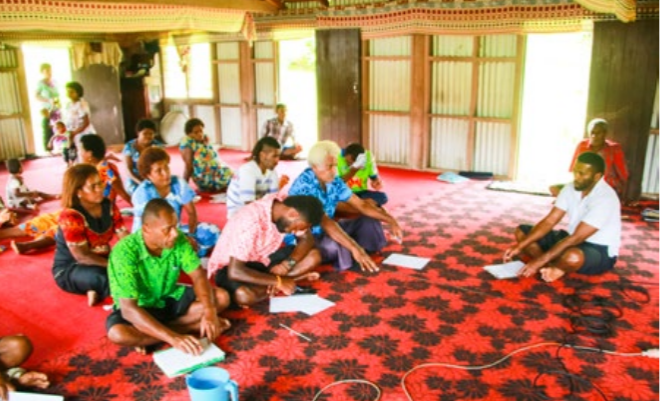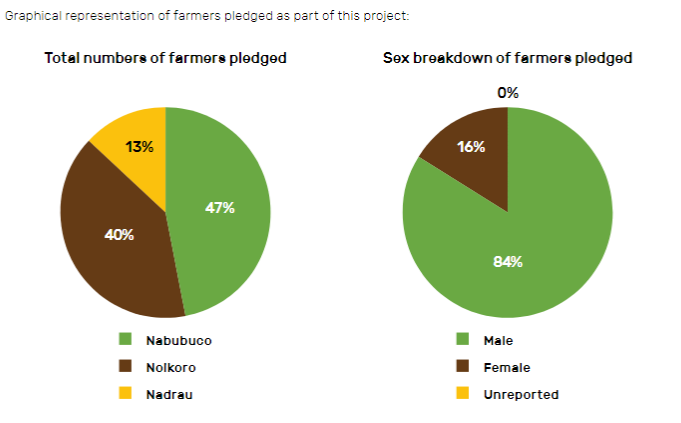Title: Establishment Of Internal Control Systems...
Donor: Partners in Community Development (PCFD)
Value: FJ$96,000
Target Countries: Fiji
Project Status: closed
Projected Timeline: 30.09.2018 - 29.06.2019
The IFAD-funded Fiji Agricultural Partnerships Project (FAPP) was implemented through the Fijian Government’s Ministry of Agriculture. The objectives of FAPP were to support the Government of Fiji in promoting the concept of “farming as a business”; effective policies to strengthen the private agribusiness sector, and agricultural value chains and marketing in rural areas. Three components are involved: (1) public sector capacity to support agribusiness; (2) assistance to SMEs working with smallholders; and (3) farming as a business for highland communities. Component 3 was designed to deliver the outcome: Reorientation of highland farmers from subsistence to production for profit, of which the Partnership for Community Development Fiji (PCDF) was the lead implementing partner. POETCom acted as the service provider for PCDF in leading the organic certification section under this component; successfully carrying out introductory organic farming trainings through the Participatory Guarantee System (PGS) by training in three districts on Viti Levu (Nabobuco district in the province of Naitasiri, and Nadrau and Naikoro districts in the province of Navosa).
Key Activities

Training of Trainers
POETCom conducted PGS trainings focused on the Pacific Organic Standard (POS) for a total of 25 participants (14 men and 11 women); ranging from officers within the Ministry of Agriculture; Ministry of Industry Trade and Tourism; PCDF; Worldwide Fund for Nature (WWF); Foundation for Rural Integrated Enterprises and Development (FRIEND); Executive Committee of the newly formed Organic Federation of Fiji; and private organisations with interest in commercial organic agriculture. These trainees are now able to assist in the implementation of PGS in communities.
Participatory Guarantee System (PGS) Training

Through PGS trainings, a total of three organic introductory trainings were held for the three districts –Nabobuco in the province of Naitasiri, and Nadrau and Naikoro districts in the province of Navosa. These districts boasted a total of 18 villages. The trainings were conducted according to the Pacific Organic Standards where farmers were introduced to the organic farming concept, registered and entered into a pledge to farm organically. The trainings were conducted within the months of February to April 2019. A total 524 people (114 women and 410 men) participated, and from this, 312 people (49 female, 261 male and 1 unknown) showed keen interest in organics and have pledged their commitment to organics and to the Project. All 312 pledges were signed between 28 January 2019 and 1 May 2019. The three main commodities the farmers aim to plant are ginger, turmeric and bananas. A significant number of youths expressed interest in organics, especially for planting kava on a new piece of land. A PGS Manual for the highlands and a database of all pledging organic farmers across the three districts were developed. Value chain maps for three targeted commodities – banana, ginger and wild harvest turmeric – were developed.
Land-use Survey
POETCom also conducted a land-use survey that identified targeted areas suitable for planting organic crops. In addition, two model farms were identified for the propagation of organic planting stock including ginger and banana. One village was observed to be practising agroforestry – the incorporation of tree species with agricultural crops on the same piece of land. Poultry was also present, with the feed sourced on farm from food wastes and greens. However, also found was the significant presence of chemical weedicides and synthetic fertilisers in certain targeted areas within these districts, and these areas have been carefully monitored, with buffer zones established as part of the internal control system.
Partnership and coordination
POETCom closely collaborated with the PCDF cluster district officers and Community Facilitators in executing the PGS organic introductory workshops in the highlands.
Key Challenges
A significant challenge was managing expectations from the community members. The queries that stemmed from the PGS trainings included the identification of the supplier of planting stock for the three identified commodities and related markets; the timeframe for certification and next steps; assistance for purchasing equipment on organic farms; supply of organic fertilisers; and identification of potential markets for dalo and yaqona. POETCom provided relevant and realistic information to the participants.
Another challenge was the tight time frame for the activities undertaken, which was resolved with an official no-cost extension of the project until June 2019 that enabled POETCom to complete the PGS Highlands Manual and a draft value chains analysis.
Lessons Learned
Strong partnerships in the form of a memorandum of understanding (MOU) and/or memorandum of agreement (MOA) are important and provide the much-needed leverage and coverage for the project.
POETCom’s MOU with PCDF and collaborations with the Ministry of Agriculture have been key in reaching out to the target groups. Exposure to valuable trainings for all genders, including men, women and youths, has been a useful development instrument and is trusted to be effective in the highlands.
POETCom continues to explore next steps and how best the farmers (and farmer organisations) can be supported so real impact can be realised.
Project Resources and Links
Highland Organic Farmers Forum Association PGS Operational Guidelines and Rules 2019